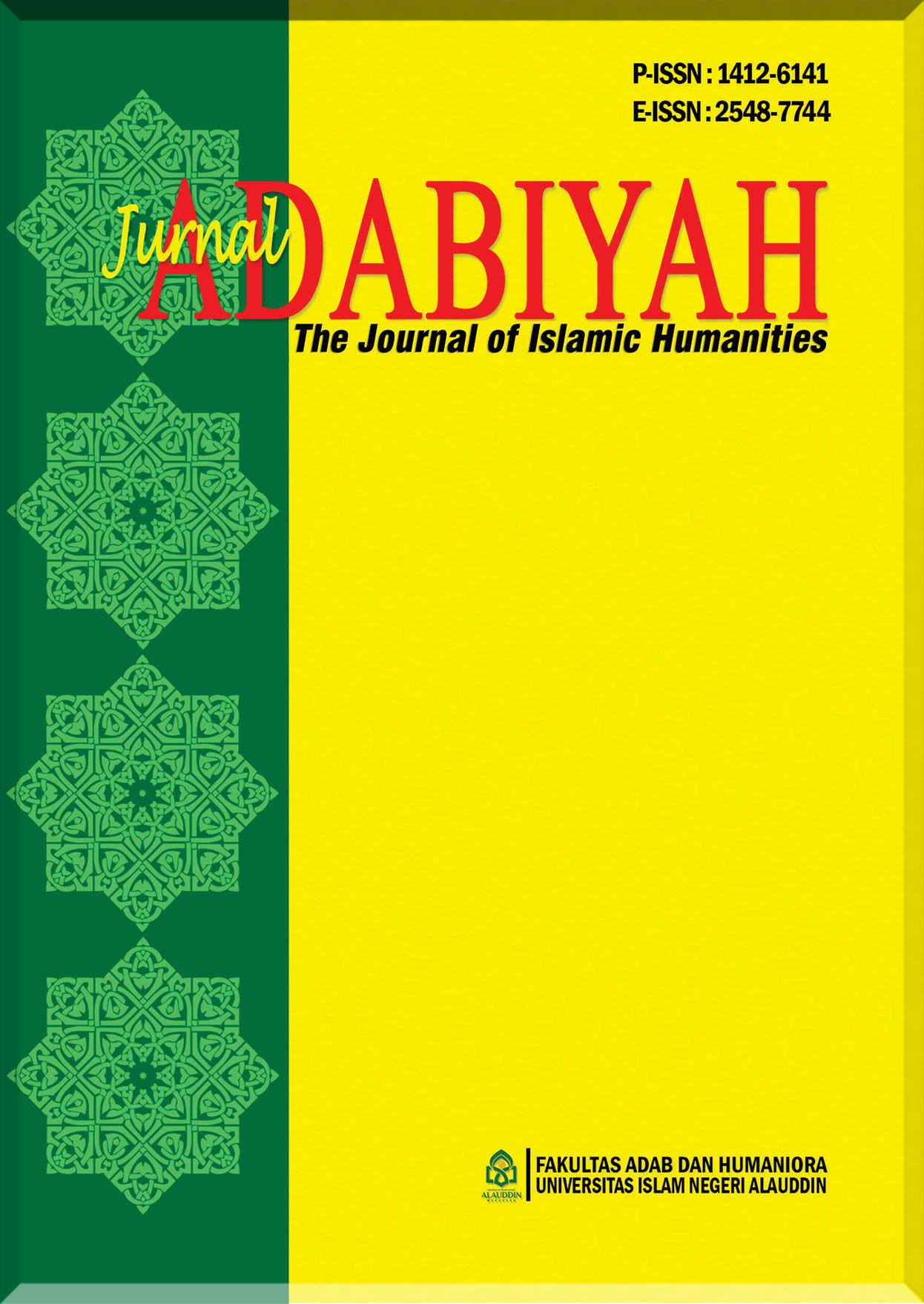PROSESI PERNIKAHAN ADAT DI KELURAHAN CIKORO’ KECAMATAN TOMPOBULU KABUPATEN GOWA
Main Article Content
Abstract
This study aimed to describe the tradition wedding procession of the Cikoro community and to analyzed the symbolic meaning behind the process. The purpose of this study is achieved by answering the following three issues: 1. How is the wedding procession in the sub-district of Cikoro Tompobulu district Gowa regency? 2. How is the symbolic meaning contained in Wedding Tradition in Kelurahan Cikoro' Tompobulu district of Gowa regency? and 3. How are the Islamic cultural values contained in it?
This study found a unique wedding procession and distinct from the wedding procession in general in South Sulawesi. In a community wedding ceremony in the village Cikoro generally consists of several stages of activity. Pre-marital stages, marriage stages, and stages after marriage. The activity is a sequential sequence that should not be mutually exchanged.
Key words: Traditional wedding procession, Cikoro, symbolic meaning.
Abstrak
Penelitian ini bertujuan untuk mendeskripsikan proses pernikahan adat masyarakat Cikoro’ dan menganalisis makna simbolis di balik proses tersebut. Tujuan penelitian ini tercapai dengan menjawab tiga masalah berikut: 1. Bagaiman prosesi pernikahan di kelurahan Cikoro’ kecamatan Tompobulu kabupaten Gowa? 2. Bagaimana makna simbolik yang terkandung dalam Adat Pernikahan di Kelurahan Cikoro’ kecamata Tompobulu kabupaten Gowa? dan 3. Bagaimana nilai-nilai budaya Islam yang terkandung didalamnya?
Penelitian ini menemukan adanya prosesi adat pernikahan yang khas dan berbeda dari prosesi pernikahan pada umumnya di Sulawesi Selatan. Dalam upacara pernikahan masyarakat di kelurahan Cikoro’ pada umumnya terdiri atas beberapa tahap kegiatan. Tahapan pra nikah, tahapan nikah, dan tahapan setelah nikah. Kegiatan tersebut merupakan rangkaian yang berurutan yang tidak boleh saling tukar-menukar.
Kata kunci: prosesi pernikahan, adat, tahapan nikah
Downloads
Article Details
COPYRIGHT AND LICENSE STATEMENT
COPYRIGHT
Jurnal Adabiyah is published under the terms of the Creative Commons Attribution license. Authors hold the copyright and retain publishing rights without restriction to their work. Users may read, download, copy, distribute, and print the work in any medium, provided the original work is properly cited.
LICENSE TO PUBLISH
1. License
The use of the article will be governed by the Creative Commons Attribution license as currently displayed on http://creativecommons.org/licenses/by/4.0.
2. Author’s Warranties
The author warrants that the article is original, written by stated author/s, has not been published before, contains no unlawful statements, does not infringe the rights of others, is subject to copyright that is vested exclusively in the author and free of any third party rights, and that any necessary written permissions to quote from other sources have been obtained by the author(s).
3. User Rights
Under the Creative Commons Attribution license, the users are free to download, reuse, reprint, modify, distribute and/or copy the content for any purpose, even commercially, as long as the original authors and source are cited. No permission is required from the authors or the publishers.
4. Co-Authorship
If the article was prepared jointly with other authors, the corresponding author warrants that he/she has been authorized by all co-authors, and agrees to inform his/her co-authors of the terms of this statement.
5. Miscellaneous
Jurnal Adabiyah may conform the article to a style of punctuation, spelling, capitalization, and usage that it deems appropriate. The author acknowledges that the article may be published so that it will be publicly accessible and such access will be free of charge for the readers.
References
Abdurrahman, Dudung. Metode Penelitian Sejarah. Cet. II. Jakarta: Logos Wacana Ilmu, 1999.
Abu Bakar, Zainal Abidin, Kumpulan Peraturan Perundang-undangan dalam Lingkungan Peradilan Agama, Cet. III; Akademika: 1992.
Aedy Hasan, Kubangun Rumah Tanggaku dengan Modal Akhlak Mulia. Cet. I; Bandung: Alfabeta, 2008.
Andi Syahraeni, Bimbingan Keluarga Sakinah, Cet, I; Makassar: Penerbit Alauddin University Press, 2013
Munandar Soelaeman, Ilmu Budaya Dasar Suatu Pengantar, Cet. IX; Bandung: Penerbit Refika Aditama, 2005
Mustaming, Al-Syiqaq Dalam Putusan Perkawinan di Pengadilan Agama Tanah Luwu. Cet. I; Yogyakarta: Deepublish, 2015.
Fuad Muhammad Khair Ash-Shalih, Sukses Menikah dan Berumah Tangga, Cet. I; Bandung: Penerbit Pustaka Setia,2006.
Idris Ramulyo, Mohd. Hukum Perkawinan Islam Cet. 1; Jakarta: Penerbit PT Bumi Aksara, 1996.
Jalil.“Aspek-aspek Islam dalam Upacara Adat Perkawinan pada Masyarakat Muslim Jawa di Kecamatan Wonomulyo Kabupaten Polmas”.Skripsi.Dr Makassar: Fakultas Adab dan Humaniora UIN Alauddin, 1987.
Kamal Mukhtar. Asas-asas Hukum Islam Tentang Perkawinan. Cet. III, PT Bulan Bintang, Jakarta. 1993)
Koentjaraningrat, Sejarah Teori Antropologi, Cet I; Jakarta: Universitas Indonesia Press, 1987.
Koentjaraningrat, Pengantar Ilmu Antropologi, Cet: III; Jakarta: Rineka Cipta, 2009.
Muhammad Shaleh Ridwan, Perkawinan Dalam Perspektif Hukum Islam Dan HukumNasional, Cet, I; Makassar: Penerbit Alauddin University Press, 2014
Munzir, Chaerul. “Tradisi Mappanre Temme”, Skripsi. Makassar: Fakultas Adab dan Humaniora UIN Alauddin, 2013.
Nonci, Adat Pernikahan Masyarakat Makassar dan Tana Toraja. Makassar: CV. Aksara, 1991
Rafael Raga Maran, Manusia dan Kebudayaan: Dalam Perspektif Ilmu Budaya Dasar Cet. III; Jakarta: Rineka Cipta, 2007.
Rasyid, Sulaiman, Fiqhi Islam. Cet: XVII; Jakarta: Attahiriyah, 1976.
Rismawati, “Tradisi Aggauk-gauk dalam transformasi Budaya Lokal di Kabupaten Takalar”, Skripsi.Makassar: Fakultas Adab dan Humaniora UIN Alauddin, 2015.
RI., Departemen Pendidikan dan Kebudayaan. Kamus Besar Bahasa Indonesia. Jakarta: Balai Pustaka, 1995
Satori, Djam’an, dan Aaan Komariah.Metodologi Penelitian Kualitatif, Cet. III; Alfabeta, 2011.
Syamsuddin, Abdullah. Agama dan Masyarakat, Pendekatan Sosiologi Agama, Cet. I; Jakarta: Logos Wacana Ilmu, 1972
Soemiyati, Hukum Perkawinan Islam dan Undang-Undang Perkawinan, Cet. IV; Yogyakarta: Liberty 1999.
T.O. Ihroni, Pokok-Pokok Antropologi Budaya, Cet. XIV; Jakarta: yayasan Pustaka Obor Indonesia, 2016.
Wahid, Sugirah. Manusia Makassar. Cet III; Makassar: Pustaka Refleksi, 2010

